TikTok will always be temporary
I now have a TikTok collection.
I write these words on January 18th, a day before TikTok shuts down in the U.S., and I spent some time this morning writing a script to download my bookmarked videos — my very favorite videos, not just the ones I “liked.”
Tomorrow, January 19th, TikTok is banned, and I will no longer be able to access any of those liked videos. I have bookmarked — and downloaded — some 332 videos.
I liked 6,000 more.


Yesterday
It’s no secret that the Internet is temporary.
Link rot is well-researched: the half-life for a link in a few studies is about 2 years. You almost certainly know of Archive.org and Wayback Machine, and you probably know projects like ArchiveBox that can collect everything you do (if you want).
Wayback Machine rescued me more than once as I did my cybersecurity research, and that’s why I now rely on Zotero (uploaded to my NAS) to snapshot every citation & link on this site — and every website I like.
And yet, this impending destruction feels different.
It’s not data loss that scares me: in fact, I expect the app to return in a few months [ed: haha].
Besides, I’ve lost data before. I’ve learned the hard way to use git; had to re-unlock the invisible GTR-1 in Midtown Madness 2 after a hard drive crashed; trashed schoolwork and artwork and photos and emails when I’ve run out of space. I scroll through dozens of “unavailable” videos in my YouTube playlists — videos I once “saved” (as Google unblushingly describes it), my reasons for doing so lost to time and banality.

No, it’s not loss. I think it’s that we’ve now delineated history.
We talk of data rotting—disappearing, losing information, corrupting — but I’ve also found that old stuff hardens, calcifies. One day, it crosses a line from “stuff I’m doing” into “stuff I did.” It becomes history—no longer to be edited.
My journals, my sketchbooks, my notebooks: they all do it. I’d never add a new page to an old journal or add a todo to an old notebook. Even my active sketchbooks, which last years, seem petrified when I return to them after a while: do I dare edit a sketch from college? Archives are brittle things. Editing those old drawings, even to add a date, is disruptive: it muddies the historical record, overwrites history.
And thus stuff hardens. Thus I have 4 slightly different backups of my previous laptop. I do not deduplicate or inspect them because ① data is cheap and ② I might leave an irreversible footprint as I step through the rock.
Today, TikTok is now. Tomorrow, TikTok will be yesterday.
I downloaded my bookmarks and uploaded them to Jellyfin, but that’s no longer TikTok — it’s an archive. If I add to it, it’s no longer a snapshot; if I remove from it, it’s incomplete. Moving those videos elsewhere, or sharing them, or even viewing them — changes them. Overwrites a file modification date, accidentally renames a file. As with a brilliant geode: looking inside is an act of destruction.
I’m plagued by what the historian Eric Ketelaar writes in Tacit Narratives: The Meanings of Archives (emphasis added):
Every interaction, intervention, interrogation, and interpretation by creator, user, and archivist is an activation of the record. The archive is an infinite activation of the record. Each activation leaves fingerprints which are attributes to the archive’s infinite meaning.
I worry that my fingerprints destroy history.
Today
And yes, data rots, too.
As I write these words, TikTok is now banned (although their site displays a gleeful message about help from our incoming president).
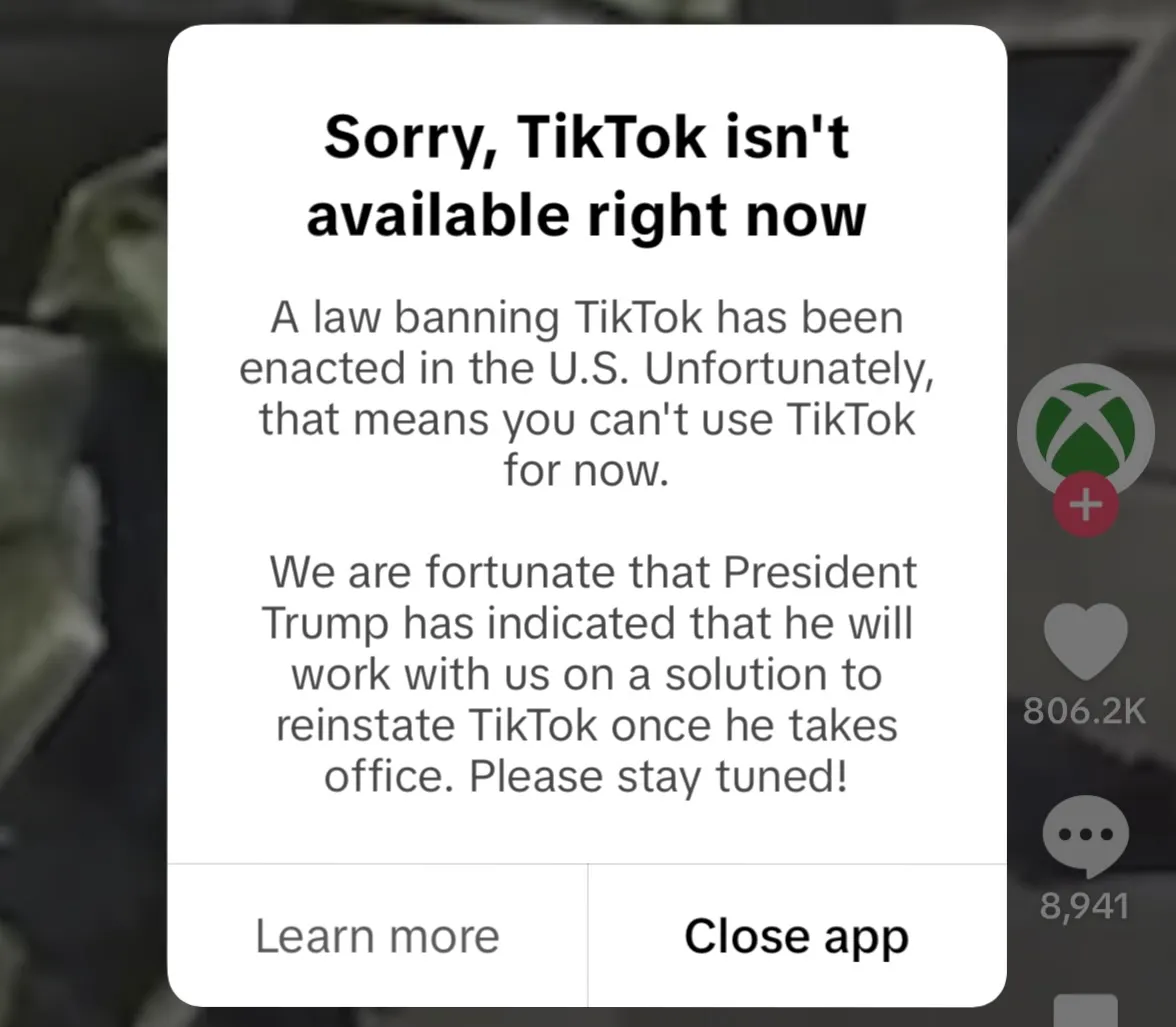
I realized that I archived all these videos without attribution — I forgot to watermark them in yt-dlp. I have no way to try again: TikTok is gone. I have a list of the original URLs, which happen to include the author’s usernames — but how long till I lose that file? Their titles, also, are mangled into filenames. I could not figure out the right way to encode them into metadata. Descriptions? Comments? Likes? Lost to time.
But even with author watermarks, even if I had all the metadata I wanted — what then?
Among my bookmarks are also a few slideshows: galleries of quotes pulled from tumblr and Twitter and books. Since yt-dlp could not figure them out, I downloaded them manually. So, unlike my videos, these slideshows are all correctly attributed: watermarked with a TikTok creator’s name.
And most of the images are attributed, too, in that unrigorous tumblr way — a scan from a book here, title below. Or a screenshot from tumblr user sarakleijn, signed “- sk”. Or just a link, or just a username, or just a different font signaling, “I did not write this, but I wanted to share it with you.”
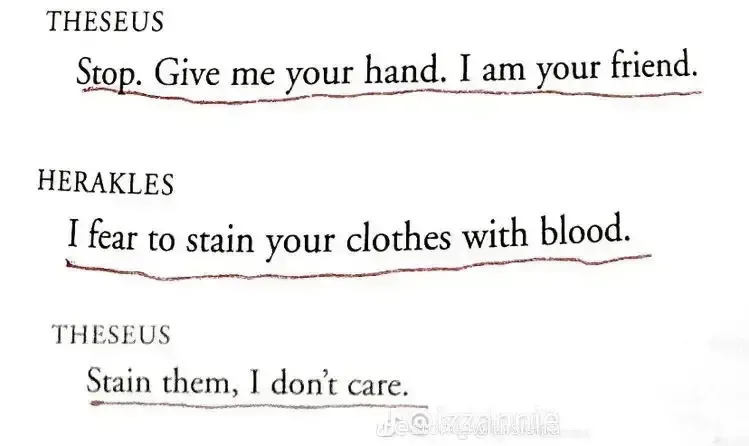
Who wrote this? Who underlined it? Who scanned it? (via @storieswithsierra)
But the attributions are meaningless. I struggle to find primary sources from just the titles; struggle to find the posts behind the screenshots. sarakleijn.tumblr.com once existed but is now gone. Searching for their work finds screenshots — echoes — instead.
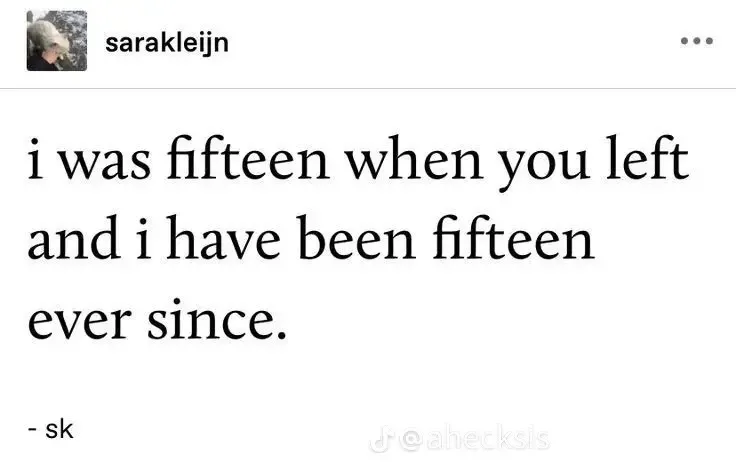
Only screenshots are left of sk’s work (via @ahecksis)
And it is hard to read the TikTok watermark on many of the images I saved: there is often another one underneath. The posts I saved were reposts from other TikToks: the app must watermark the same place each time! The original watermarks were easy to read — the work “cited”, not "stolen"—until I chose to pull these photos from their home.
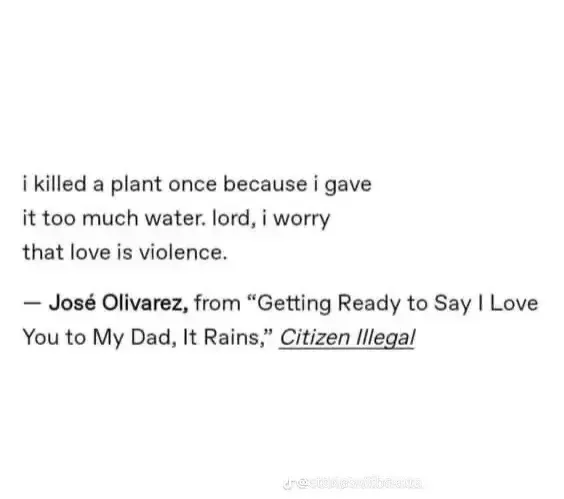
Trying to preserve them rotted them out from under me.
Tomorrow
Tomorrow is now today, and TikTok is now unbanned. The app is back (with another gleeful message).
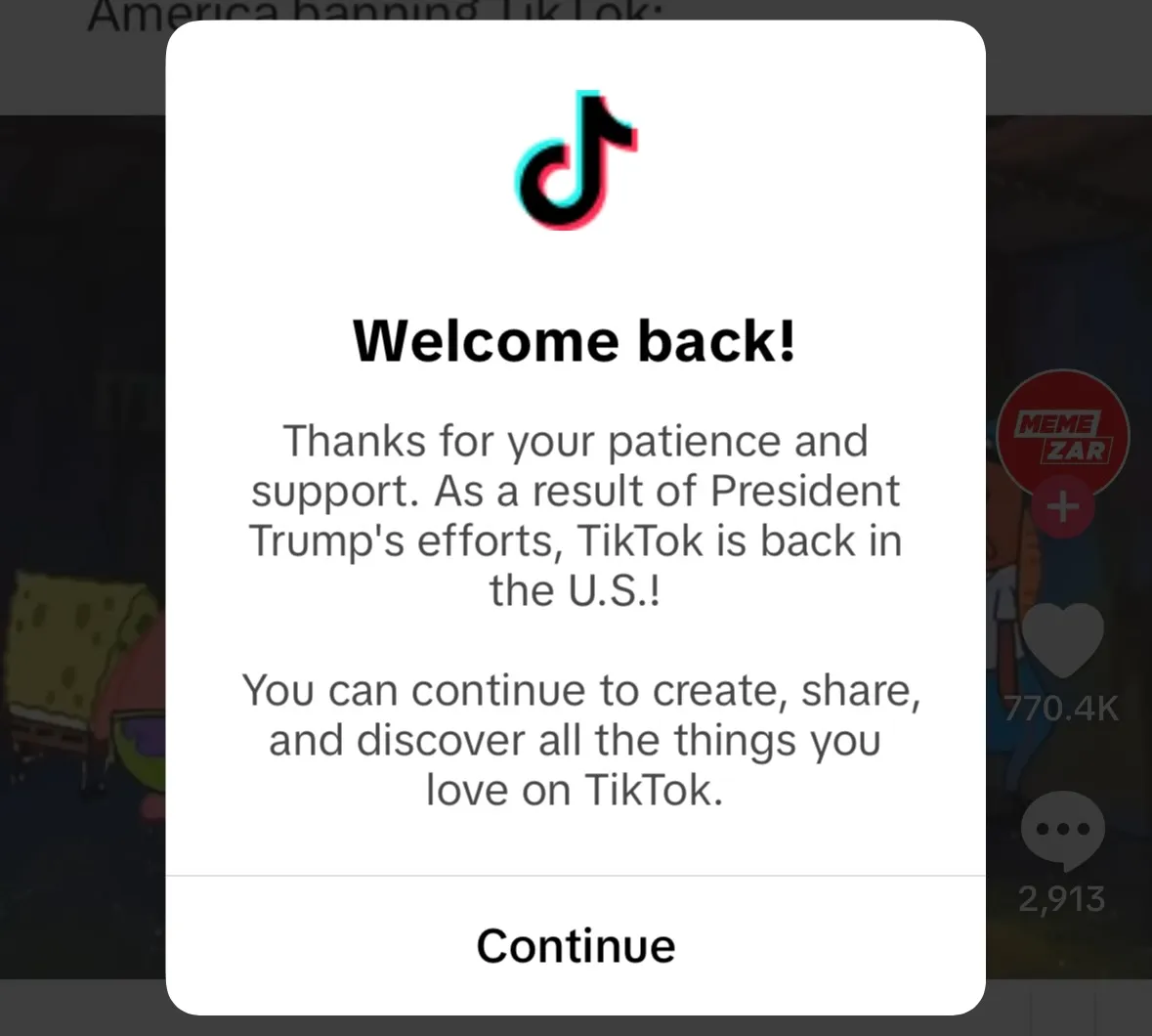
I can fix my archive now. So should I redownload my data? Should I save more stuff? Should I go back and archive all 6,000 liked videos? My entire view history?
My archive is redundant, for now. But I’m certain that some of those videos will become “unavailable” as time passes, just like those in my YouTube playlists.
My sister, as she studies history, tells me historians delight in archives like mine (I imagine a paper entitled, "Noot Noot & Mozart: One Man’s TikTok From COVID to the First TikTok Ban").
So download everything now? Save the YouTube videos, too?
Save everything?
My girlfriend and I discussed different reasons to save. There is the functional: to remember this restaurant, this recipe, this interesting thought. And there is the delightful: for no purpose at all — beyond, perhaps, “I like this now, I may like it again later.”
For example, she mentioned something we’d recently learned: on September 2, 1666, Samuel Pepys woke up and first saw the Great Fire of London — but thought it “far enough off” that he went back to bed:
So I rose and slipped on my nightgowne, and went to her window, and thought it to be on the backside of Marke-lane at the farthest; but, being unused to such fires as followed, I thought it far enough off; and so went to bed again and to sleep.
Is it necessary this knowledge was preserved? Maybe not, but it is certainly delightful.
Or consider Jane Johnson, sorting through her husband’s effects after his death:
The other side of this paper was wrote by the Revd Woolsey Johnson. Jane Johnson 1756. I apprehend it can be of no use
Unnecessary, “of no use”, but kept for some reason or sentiment — to the delight of a researcher 300 years later.
We reliably underestimate the future benefit of our stuff. I, too, have learned the hard way to save more.
I keep notebooks for mundanities because I’ve forgotten important names & dates in the past. I store multiple versions of my code because I’ve broken things & lost hours trying to undo it. I save almost every photo I take because my “trash” from 2014 holds some of my favorite memories.
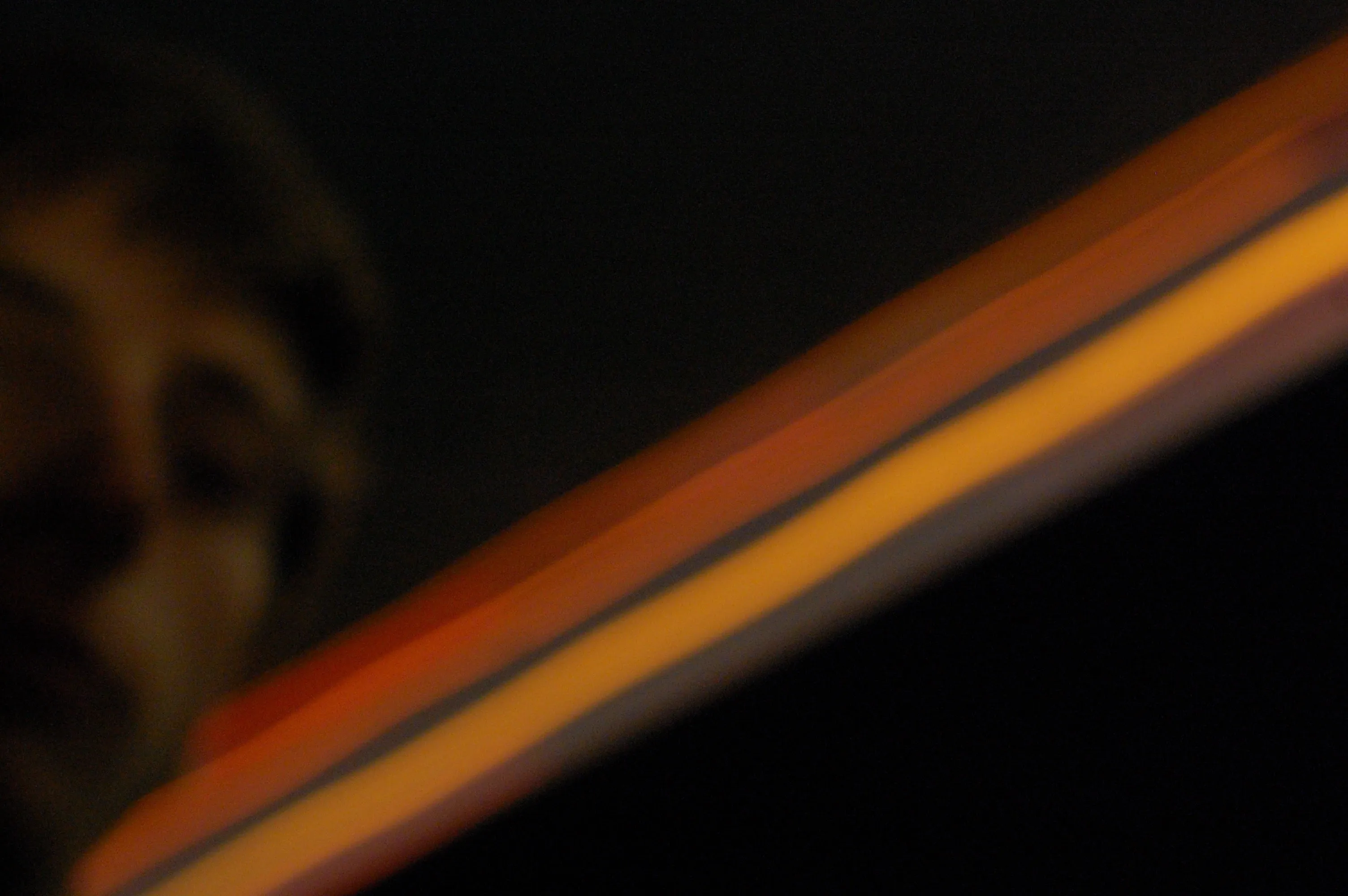
And, for most stuff, literal cost is negligible. Google claims that my 53,000 emails — 15 years’ worth — are less than 6GB of text. That’s 1,800 copies of War and Peace, and they fit on a $5 thumbdrive. Music and videos are still expensive to store, but how long will that be true?
The crux is emotional cost. Archiving data is exhausting.
For some, it’s the emotional weight of knowing something’s there. For others, it’s the prospect of keeping it organized. For me, it’s the same as before: data rots—it’s incorrect & incomplete — and it hardens—it’s brittle & crumbles as you examine it.
Tools have made this better:
- I feel no stress editing this article because I have tools to keep every old version.
- I don’t worry about Facebook messages or iMessage history because those apps timestamp everything for me.
- I can edit photos because most photo software preserves the originals automatically.
But no matter what we fear or what tools we have, there is one simple fact: we cannot save everything.
No archive can capture how tangible TikTok feels — it’s alive. I could try to capture everything. I could save every detail: every comment, every like, my heart rate & cortisol levels as I watch. But TikTok is alive; it lives in its own unique context, it doesn’t want to escape. It dies when you take it out.
And so we’re back — the sadness of delineating history.
I do not want TikTok to be history. I already cannot deduplicate 4 redundant backups of my last computer. I do not wish to be responsible for archiving TikTok, too.
A month from now
I’ve been writing and rewriting this conclusion for about a month now, searching for an answer. Meanwhile, the app is back in the App Stores. My TikTok archive remains unfixed.
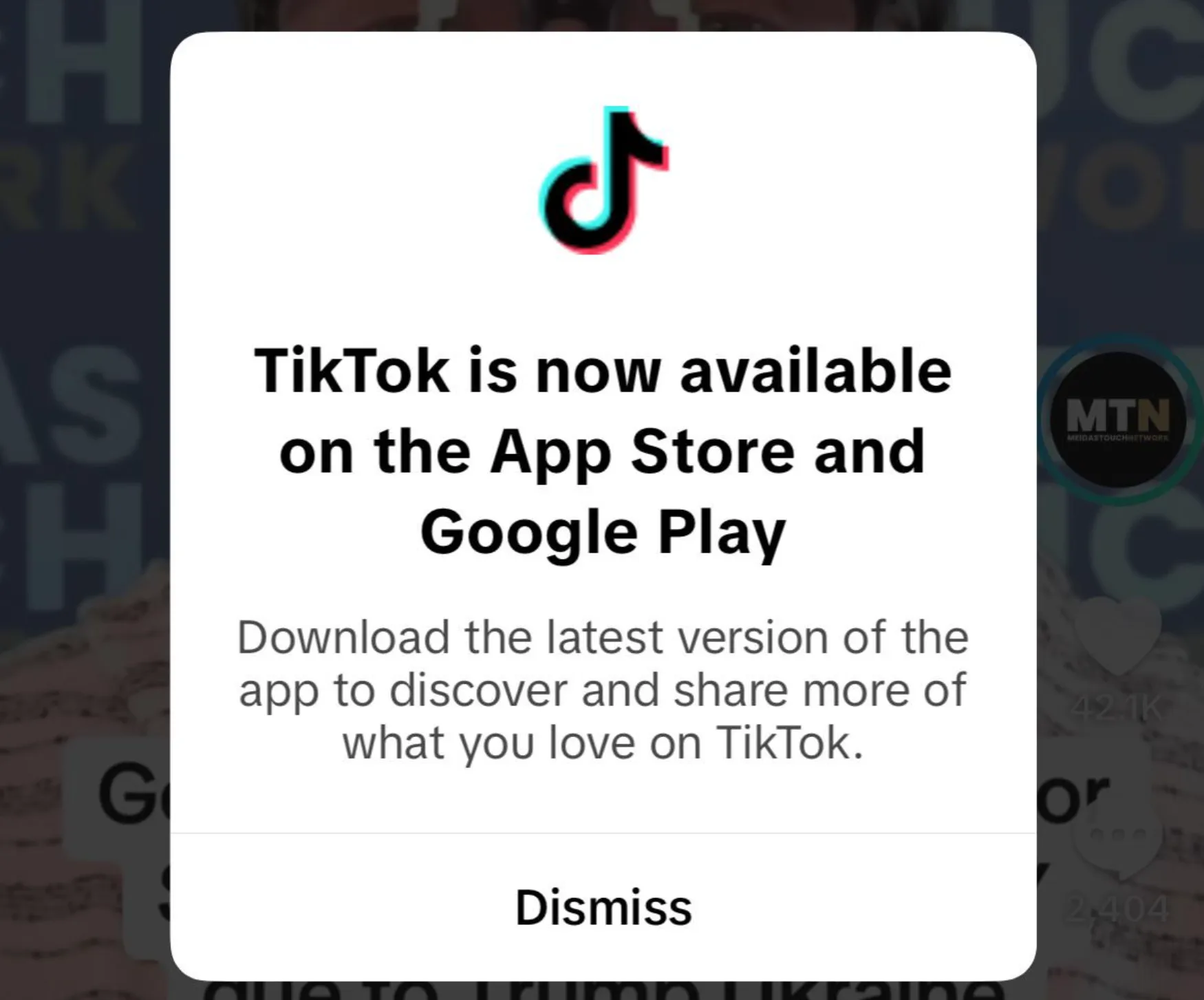
Maybe I’m writing an entreaty to build better tools: “make it easier for me to save TikTok!” Maybe I’m writing a morality play on the dangers of misusing yt-dlp.
Or maybe I’m writing an elegy for something that hasn’t died quite yet.
TikTok is temporary.
It will shut down, someday. It will all shut down someday. By law or by popular vote, TikTok will go away, just as Vine went away, as Samuel Pepys went away, as the Great Fire of London went away, as Jane Johnson & her husband went away, as my NAS & everything I value will go away.
My data scientist friend shared an old term paper with me where she laments the fragility of file formats & the short half-life of hard drives — even magnetic tapes only last 50 years.
I do not want to wrestle with that. Maybe I avoid updating my archive as a little protest against that temporariness. TikTok is still alive, so why archive it?
We talk of data “living on”, but I think it’s harder than that. Data doesn’t simply live on: it must fight for continued existence. It does not just survive: it must endure. We have so little control over what lasts, what endures, and how long. Archiving TikTok acknowledges that it will eventually decay into nothingness.
Jane Johnson’s daughter, Barbara, begged we preserve a memorandum of notable events of her brother’s life:
I beg it may be preserv’d Barbara Johnson
How many similar memorandums have disappeared?
I realized that we learned about what Samuel Pepys did on September 2, 1666, from:
- The online copy of Samuel Pepys’s diary…
- …linked from a reddit comment (@ctothel)…
- …correcting another reddit comment (@campbelljac92)…
- …on a now-removed reddit post (@Frosty-Feeling2316).
His diary endures because generations of scholars said, “this is worth saving.” It endures because two strangers on the Internet thought it was worth sharing. It endures because my girlfriend reminded me of it as I wrote this article.
His diary endures, and hopefully now that context will, too. On Reddit’s servers, on archive.today, and screenshotted here:
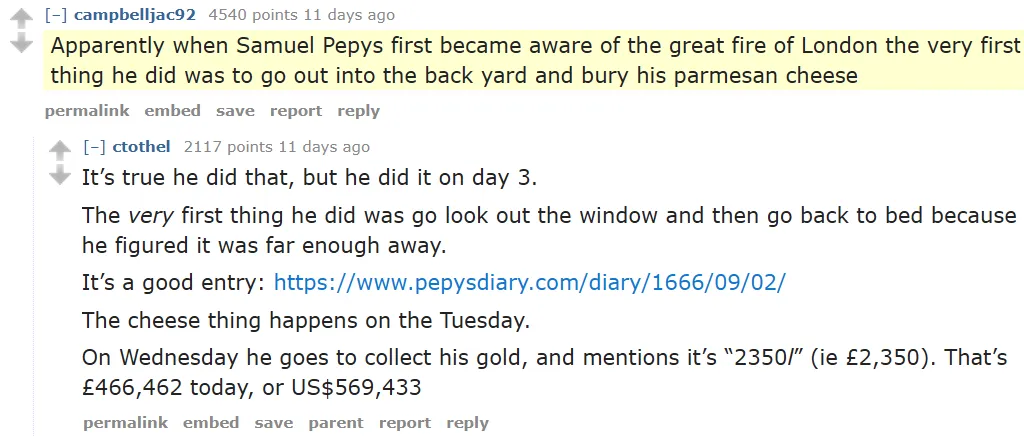
I am not emotionally ready to save all of TikTok. Maybe someday, with better tools, but in the meantime I have 332 videos. I hope they bring me, or someone else, joy when TikTok is gone. I think they are worth saving. And in the same spirit of helping things endure — both the artifact and its archives — here is something else I found, in one of those TikToks, that I think is worth saving. It’s:
- A now-deleted tumblr post by @swanjolras…
- …screenshotted & attached to a tumblr thread by @alicibiades-hackes-it…
- …in response to @starblaster and @perfectly-princely-emo-nightmare…
- …screenshotted by someone & uploaded to a TikTok by @metlxiang…
- …downloaded from TikTok & reuploaded to a TikTok by @thinkingaboutclouds…
- …downloaded from TikTok by me…
- …and reuploaded here.
Full of all our accidental fingerprints & artifacts & watermarks, but enduring nevertheless.
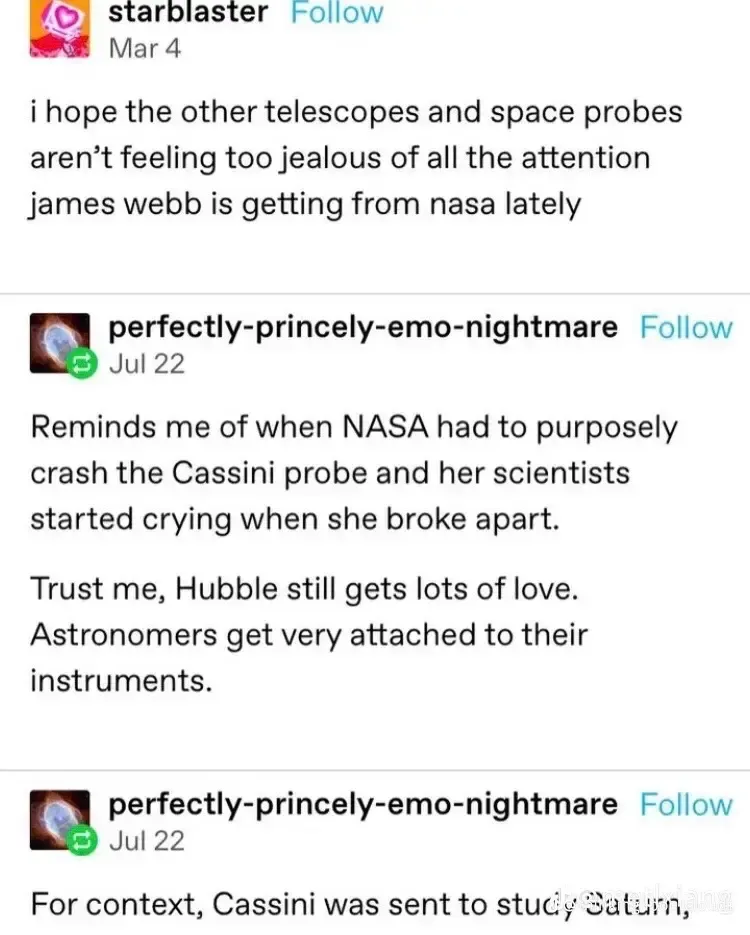
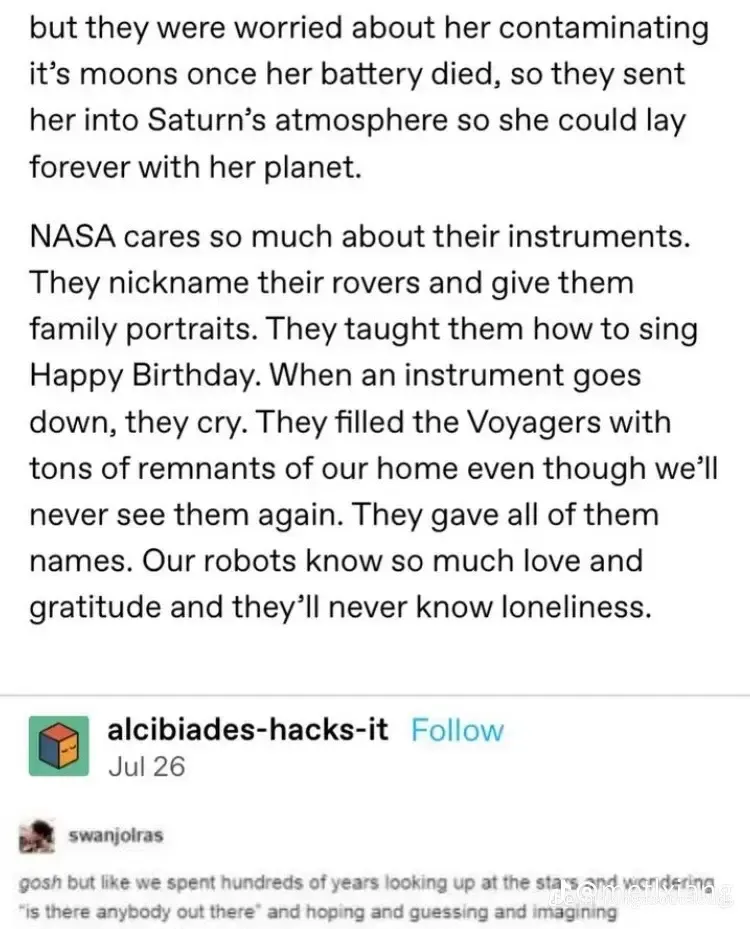
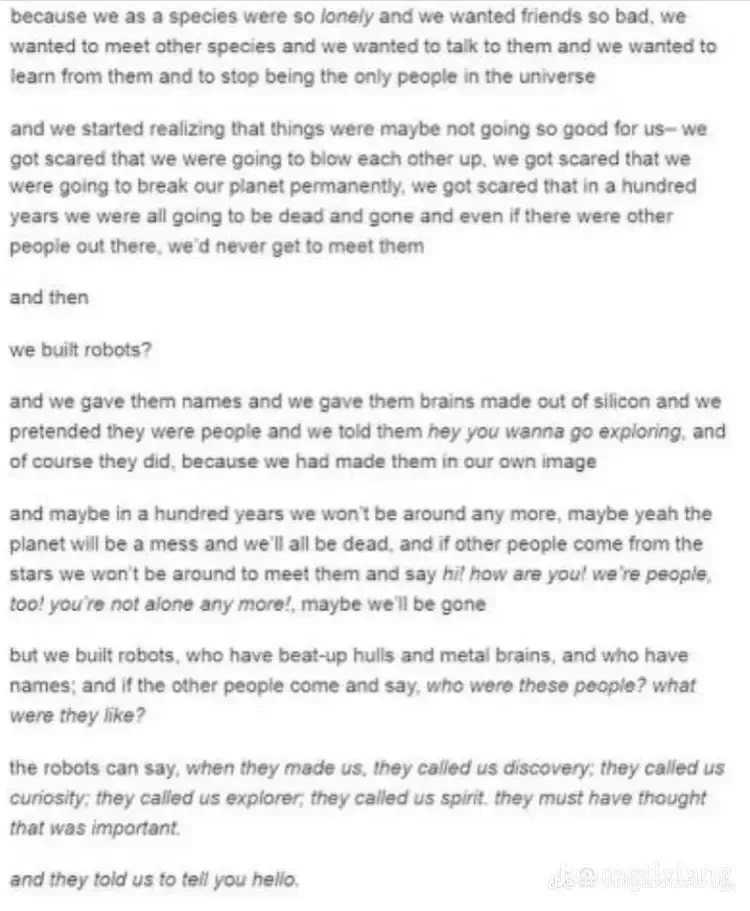
While TikTok is alive, you can view the slideshow here. But when it’s gone, ① I’ve archived the TikTok, ② I’ve archived the tumblr thread, and ③ someone archived the original post.
I beg it may be preserv’d.
Ben Stolovitz.
Thanks to Atherai Maran, Adele Stolovitz, and Yennie Jun for consulting on this article. Thanks to Atherai Maran for editing.
Want more articles like this?
No spam. Just an email for new posts.Transcription: found on TikTok
starblaster: i hope the other telescopes and space probes aren’t feeling too jealous of all the attention james webb is getting from nasa lately
perfectly-princely-emo-nightmare: Reminds me of when NASA had to purposely crash the Cassini probe and her scientists started crying when she broke apart.
Trust me, Hubble still gets lots of love. Astronomers get very attached to their instruments.
perfectly-princely-emo-nightmare: For context, Cassini was sent to study Saturn, but they were worried about her contaminating it’s moons once her battery died, so they sent her into Saturn’s atmosphere so she could lay forever with her planet.
NASA cares so much about their instruments. They nickname their rovers and give them family portraits. They taught them how to sing Happy Birthday. When an instrument goes down, they cry. They filled the Voyagers with tons of remnants of our home even though we’ll never see them again. They gave all of them names. Our robots know so much love and gratitude and they’ll never know loneliness.
alcibiades-hacks-it:swanjolras
gosh but like we spent hundreds of years looking up at the stars and wondering “is there anybody out there” and hoping and guessing and imagining
because we as a species were so lonely and we wanted friends so bad, we wanted to meet other species and we wanted to talk to them and we wanted to learn from them and to stop being the only people in the universe
and we started realizing that things were maybe not going so good for us– we got scared that we were going to blow each other up, we got scared that we were going to break our planet permanently, we got scared that in a hundred years we were all going to be dead and gone and even if there were other people out there, we’d never get to meet them
and then
we built robots?
and we gave them names and we gave them brains made out of silicon and we pretended they were people and we told them hey you wanna go exploring, and of course they did, because we had made them in our own image
and maybe in a hundred years we won’t be around any more, maybe yeah the planet will be a mess and we’ll all be dead, and if other people come from the stars we won’t be around to meet them and say hi! how are you! we’re people, too! you’re not alone any more!, maybe we’ll be gone but we built robots, who have beat-up hulls and metal brains, and who have names; and if the other people come and say, who were these people? what were they like?
the robots can say, when they made us, they called us discovery; they called us curiosity; they called us explorer; they called us spirit. they must have thought that was important.
and they told us to tell you hello.
Transcription: Samuel Pepys on reddit
campbelljac92: Apparently when Samuel Pepys first became aware of the great fire of London the very first thing he did was go out into the back yard and bury his parmesan cheese
ctothel: It’s true he did that, but he did it on day 3.
The very first thing he did was go look out the window and then go back to bed because he figured it was far enough away.
It’s a good entry: https://www.pepysdiary.com/diary/1666/09/02/
The cheese thing happens on the Tuesday.
On Wednesday he goes to collect his gold, and mentions it’s "2350l" (ie £2,350). That’s £466,462 today, or US$569,433